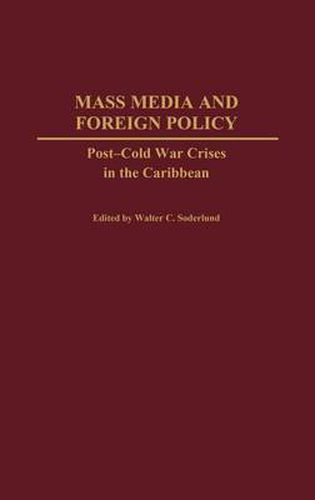Readings Newsletter
Become a Readings Member to make your shopping experience even easier.
Sign in or sign up for free!
You’re not far away from qualifying for FREE standard shipping within Australia
You’ve qualified for FREE standard shipping within Australia
The cart is loading…






An empirical examination of U.S. network coverage of seven post-Cold War crises occurring in the Caribbean Basin and an analysis of ongoing government-press relations. The terrorist attacks on the United States that occurred on September 11 marked the end of an historical era known as the post-Cold War period. During this time, the U.S. government produced no clear media guidelines for dealing with world crises, and media coverage increasingly came to be focused on domestic conflicts rather than international ones. In the absence of a clearly defined threat, no dominant media frame replaced the time-worn Cold War in media reporting. Mass media has been recognized as an important intermediary between the government and the population. In this context, this study examines network coverage of seven post-Cold War crises, ranging from Cuba to Mexico, occurring in the Caribbean Basin between 1990 and 1996 to evaluate the framing of these events by the various media covering them. In providing context for understanding these crises, this examination reviews U.S. policy in each case and discovers a strong correlation between the level of U.S. involvement in the crisis and the amount of media attention generated. By appearing on the news or not, the president along with key Cabinet members were able to define whether an event constituted a crisis for the United States. In instances where the media received little guidance from Washington officials on the implications for the United States, the media did attempt to provide explanations of events, however, coverage tended to be minimal. Case studies include the recording and coding of language used as positive, negative, and neutral/ambiguous.
$9.00 standard shipping within Australia
FREE standard shipping within Australia for orders over $100.00
Express & International shipping calculated at checkout
An empirical examination of U.S. network coverage of seven post-Cold War crises occurring in the Caribbean Basin and an analysis of ongoing government-press relations. The terrorist attacks on the United States that occurred on September 11 marked the end of an historical era known as the post-Cold War period. During this time, the U.S. government produced no clear media guidelines for dealing with world crises, and media coverage increasingly came to be focused on domestic conflicts rather than international ones. In the absence of a clearly defined threat, no dominant media frame replaced the time-worn Cold War in media reporting. Mass media has been recognized as an important intermediary between the government and the population. In this context, this study examines network coverage of seven post-Cold War crises, ranging from Cuba to Mexico, occurring in the Caribbean Basin between 1990 and 1996 to evaluate the framing of these events by the various media covering them. In providing context for understanding these crises, this examination reviews U.S. policy in each case and discovers a strong correlation between the level of U.S. involvement in the crisis and the amount of media attention generated. By appearing on the news or not, the president along with key Cabinet members were able to define whether an event constituted a crisis for the United States. In instances where the media received little guidance from Washington officials on the implications for the United States, the media did attempt to provide explanations of events, however, coverage tended to be minimal. Case studies include the recording and coding of language used as positive, negative, and neutral/ambiguous.